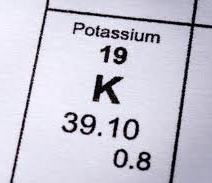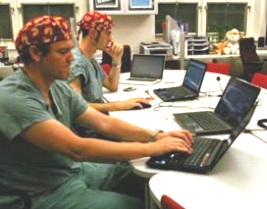July 24th, 2011 by Toni Brayer, M.D. in Health Tips, Opinion
No Comments »

 For years I have touted the health benefits of the “Mediterranean Diet” and encouraged patients to eat like the Europeans. Fresh farm vegetables, olive oil, fish and red wine have been linked with longevity and good health. I just read in NPR news that young Italians are forgoing the eating patterns of their elders and are imitating the “U.S. diet”. The result is soaring obesity, just like in the United States.
For years I have touted the health benefits of the “Mediterranean Diet” and encouraged patients to eat like the Europeans. Fresh farm vegetables, olive oil, fish and red wine have been linked with longevity and good health. I just read in NPR news that young Italians are forgoing the eating patterns of their elders and are imitating the “U.S. diet”. The result is soaring obesity, just like in the United States.
According the the article, young Italians ages 6-12 are sitting in front of the TV and are eating fast foods and soda. In just three generations, the eating habits and activity of kids has changed from their healthy grandparents. Italian health officials say obesity is reaching epidemic proportions.
Part of the diet changes are a result of Read more »
*This blog post was originally published at EverythingHealth*
March 4th, 2011 by Toni Brayer, M.D. in Health Tips, Research
No Comments »

 There are few medical conditions that people fear more than a stroke. We know that blood pressure control and lowering cholesterol levels reduces stroke risk. Now, thanks to a huge analysis from Italy published in the Journal of the American College of Cardiology, we know that higher dietary consumption of potassium is associated with lower rates of stroke and could also reduce the risk of coronary heart disease and total cardiovascular disease, too. What is even more remarkable is that the results apply to all parts of society and not just to specific “at-risk” subgroups.
There are few medical conditions that people fear more than a stroke. We know that blood pressure control and lowering cholesterol levels reduces stroke risk. Now, thanks to a huge analysis from Italy published in the Journal of the American College of Cardiology, we know that higher dietary consumption of potassium is associated with lower rates of stroke and could also reduce the risk of coronary heart disease and total cardiovascular disease, too. What is even more remarkable is that the results apply to all parts of society and not just to specific “at-risk” subgroups.
Most doctors aren’t even aware of how important it is to eat potassium-rich foods. And what are these foods that have potassium? Surprise: It’s fruits and vegetables like bananas, tomatoes, oranges, apricots, most legumes, spinach, winter squash, avocado, kiwi, and cantaloupe. Actually, almost all fruits and veggies have moderate to high potassium content.
The researchers looked a number of well-done studies that included 247, 510 participants over age 30 and found that those patients with the higher potassium intake reduced their stroke risk by 21 percent. The Italian doctors say the protective effect of potassium against stroke is in part due to its blood pressure lowering effects and also due to other properties of the potassium mineral, such as the inhibition of free radical formation.
I’ve written before about the DASH diet, which also found that reduction of sodium and addition of fruits and vegetables to the diet is an effective way to control blood pressure. The DASH diet is high in potassium.
Think about it: Did you have five servings of fruits and vegetables today? Numerous studies have shown their life-prolonging benefits. This new study just adds to what we already know. I challenge all readers to keep a diet count and make sure you are eating five fruit and vegetable servings a day — every day — to help reduce your risk of stroke, cancer, and heart attack.
*This blog post was originally published at EverythingHealth*
November 23rd, 2010 by Glenn Laffel, M.D., Ph.D. in Better Health Network, News, Research
No Comments »

 Like their counterparts in other first-world countries, French people know about the health benefits of exercise. And French culture has emphasized, even worshipped, good looks (which these days translates to “fit and trim.”)
Like their counterparts in other first-world countries, French people know about the health benefits of exercise. And French culture has emphasized, even worshipped, good looks (which these days translates to “fit and trim.”)
So it’s surprising that the French avoid fitness centers as vigorously as factory-produced croissants. But they do.
According to the International Health, Racquet and Sportsclub Association, just 5.4 percent of French people were members of a fitness club in 2008. That’s substantially less than their counterparts in Italy (9.5 percent), the UK (11.9 percent), and Spain (16.6 percent).
“It appears that more people are sitting in cafes smoking cigarettes and drinking coffee than working out … the French don’t see fitness as a lifestyle,” American-born fitness consultant Fred Hoffman told MSNBC. Hoffman has lived in Paris for two decades. Read more »
*This blog post was originally published at Pizaazz*
September 18th, 2010 by Medgadget in Better Health Network, News, Research
No Comments »

 Just two weeks after we reported on teleanesthesia in the form of remotely-performed nerve blocks, the first report of transcontinental anesthesia comes in.
Just two weeks after we reported on teleanesthesia in the form of remotely-performed nerve blocks, the first report of transcontinental anesthesia comes in.
On August 30, anesthesiologists of McGill-McGill University Health Centre in Montreal, kept watch over a patient in Pisa, Italy, undergoing thyroid gland surgery. Basically they used a teleconferencing setup with four cameras, with two cameras streaming the anesthesia data (ventilation parameters and vital signs), one camera aimed at the operating field, and the last one for any special purposes. Read more »
*This blog post was originally published at Medgadget*
August 21st, 2010 by John Mandrola, M.D. in Better Health Network, Health Tips, News, Opinion, Research
No Comments »

I saw a prescient story that linked antagonistic personality traits and cardiovascular risk. It was simply impossible to ignore. Low hanging fruit, no doubt.
The article highlights an NIH-sponsored study [published in the August 16th journal Hypertension] that looked at the effects of antagonistic traits — agreeableness, per se — on heart health. Yes, you read it right — agreeableness. To quantify agreeableness, the researchers used a personality questionnaire which included six traits: Trust, straightforwardness, altruism, compliance, modesty, and my favorite…tender-mindedness.
Your hypothesis is probably right: People who were distrustful, cynical, manipulative, self-centered, and quick to express anger fared worse. But please don’t dismiss this as just another mundane study proclaiming the risks of an angry personality. The specifics of the findings and their implications really hit hard. Read more »
*This blog post was originally published at Dr John M*
 For years I have touted the health benefits of the “Mediterranean Diet” and encouraged patients to eat like the Europeans. Fresh farm vegetables, olive oil, fish and red wine have been linked with longevity and good health. I just read in NPR news that young Italians are forgoing the eating patterns of their elders and are imitating the “U.S. diet”. The result is soaring obesity, just like in the United States.
For years I have touted the health benefits of the “Mediterranean Diet” and encouraged patients to eat like the Europeans. Fresh farm vegetables, olive oil, fish and red wine have been linked with longevity and good health. I just read in NPR news that young Italians are forgoing the eating patterns of their elders and are imitating the “U.S. diet”. The result is soaring obesity, just like in the United States.






 Just two weeks after we reported on teleanesthesia in the form of
Just two weeks after we reported on teleanesthesia in the form of 








